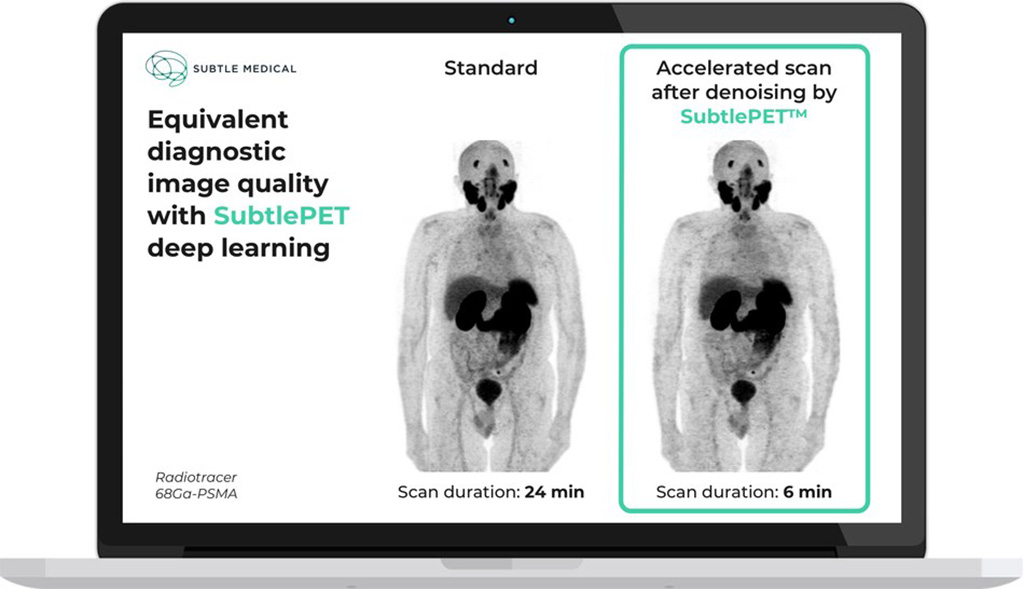AI Software Can Cut PET Scan Time in Half
Posted on 27 May 2022
Recent research in PET has focused on decreasing noise and increasing signal-to-noise ratios (SNR). Digital PET with silicon photomultipliers (SiPM) has led to improved timing, energy, spatial resolution, and effective time-of-flight (TOF) sensitivity. This has resulted in faster scanning with less injected activity. However, despite these advances, there is an ever-increasing demand for PET scans, which can contribute to significant delays in scheduling examinations and patient management. Deep learning (DL), a subdivision of artificial intelligence (AI), has many emerging applications in nuclear medicine. DL is able to increase PET resolution, decrease noise, and thus enhance image quality. It may allow for reducing injected activity, acquisition time, or a combination of both. Now, a new study that investigated whether AI-based denoising halves PET acquisition time in digital PET/CT has found that AI allows [18F]FDG PET duration in digital PET/CT to be halved, while restoring degraded ½-duration PET image quality.
The study by investigators at Baclesse Cancer Center (Caen, France) examined Subtle Medical, Inc.’s (Menlo Park, CA, USA) SubtlePET post-reconstruction PET denoising software that has been approved by the Food and Drug Administration and validated by the European Commission for [18F]FDG PET. The algorithm is based on deep convolutional neural networks (DCNN), the most common DL architecture. SubtlePET uses multi-slice 2.5D encoder-decoder U-Net DCNN. It takes the pixel’s neighborhood into account to reduce noise and increase image quality. Using a residual learning approach that is optimized for quantitative (L1 norm) and structural similarity (SSIM), it has learned to separate and suppress noise components while preserving non-noise components.

The software applies denoising to improve the image quality of low count PET (positron emission tomography) scans acquired in up to 25% of the original scan time, enabling centers to expedite patient care and improve patient comfort during PET exams. SubtlePET is FDA-cleared for use with 18F-FDG and 18F-Amyloid tracers and is CE-marked for use with 18F-FDG, 18F-Amyloid, 18F-Fluciclovine, 18F-DOPA, 18F-Choline, 18F-DCFPyL, Ga-68 Dotatate, and Ga-68 PSMA radiotracer PET images, expanding coverage for Prostate (PSMA) and Neuroendocrine tumors. The vendor-neutral software is a virtual upgrade to any brand of PET or PET/CT machine that boosts scanner performance across the entire fleet.
In the latest study, researchers aimed to evaluate the feasibility of halving PET acquisition time in a routine clinical setting by using SubtlePET while preserving visual and semi-quantitative PET performances in digital TOF PET/CT. The prospective study showed good visual and semi-quantitative performances of AI-denoised half-count PET compared to original PET in a digital PET/CT. The researchers simulated a two-fold reduction in the PET acquisition time and then applied SubtlePET. All PET series were successfully denoised within two minutes in an automatic workflow using a common GPU card. This makes it compatible with routine clinical use.
Visually, global image quality scores were similar between PET90 and PET45AI but lower and clinically insufficient in half-count PET45 due to high noise. The researchers obtained a few discordances (2.3%) between original PET90 and denoised PET45AI in the absolute detection of 856 lesions. The study findings support the routine use of Subtle PET combined with a two-fold faster PET acquisition. According to the researchers, the benefit of decreasing PET duration, thus reducing waiting time for appointments and helping patients who experience discomfort, outweighs the minor decrease in performance.
Related Links:
Baclesse Cancer Center
Subtle Medical, Inc.














